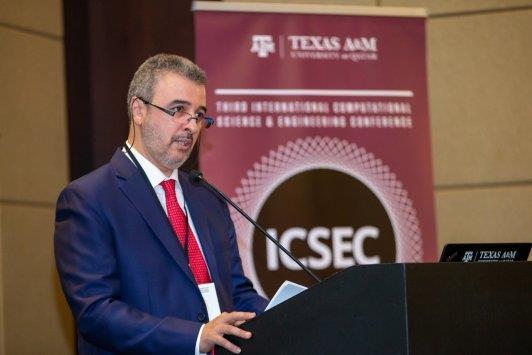
Qatar- QF expert developing AI tech to reduce side effects of radiotherapy
(MENAFN- The Peninsula) Doha: Personalized radiation dose for breast cancer can reduce the risk of cardiovascular disease, according to Director of Research Computing and Professor at Qatar Foundation (QF) partner Texas A & M University at Qatar (TAMU-Q), Dr. Othmane Bouhali.
Cancer treatment through radiotherapy has significantly increased the number of cancer survivors, but it has also increased the chances of these patients going on to develop cardiovascular disease particularly in the case of breast cancer.
'Global statistics say in the past 20-25 years, a significant fraction of women who were treated for breast cancer using radiotherapy have gone on to develop cardiovascular disease (CVD) within 5-10 years of receiving their first dose, said Dr. Bouhali.
With breast cancer being the most common cancer in Qatar, this is a concern. However, Dr. Bouhali said he believes this side effect can be significantly reduced by optimizing the radiotherapy dosage.
Building on his years of experience in medical physics and supercomputing, he is attempting to achieve this with the help of artificial intelligence (AI). 'The increased risk of CVD is not a direct consequence of radiotherapy but is a product of the dosage, Dr. Bouhali said. 'If we can optimize the dose quantity to be the minimum amount needed to be effective, and also angle the X-rays such that they hit the tumor cells while staying as far as possible from the heart, I believe the risk of CVD can be reduced.
'At present, radiotherapy dose is calculated using classical software that is based on approximations as it's time-efficient. It is reliable but not precise and in most cases, it gets the job done. To be able to calculate the precise dosage, much more sophisticated software needs to be used.
Monte Carlo simulation is one such software. However, it takes hours to compute the right dosage, making it impractical to be used in a hospital setting. And Dr. Bouhali's group is attempting to combine the Monte Carlo simulation with a powerful machine learning algorithm that his team has developed. Once developed, it could considerably reduce the time needed to determine the precise dose that would be suitable for a particular patient.
'We have already developed the algorithm; we are now in the process of ‘teaching' it using existing patient data.
Commenting on the challenges faced, Dr. Bouhali said: 'Access to data remains AI's biggest challenge, not just in Qatar but all over the world. AI has so much potential, especially in the medical sector, but it is crucial to understand it can't and won't progress without access to data. Unless researchers are given access to data, we will not be able to deliver the promises of AI.
In another project in collaboration with a local hospital, Dr. Bouhali's team is looking at ways to identify which stage a patient's cancer is in by looking at tumor images and processing them using artificial intelligence. At present, doctors determine a cancer's grade by performing a biopsy, an invasive procedure in which doctors remove a piece of the affected tissue and analyze it to determine how much a cancer has spread.
Working closely with local and international hospitals, Dr. Bouhali said he hopes his work will pave the way for data-driven, personalized dosage that will maximize the probability of treatment success and minimize radiation side effects for patients.

Legal Disclaimer:
MENAFN provides the
information “as is” without warranty of any kind. We do not accept
any responsibility or liability for the accuracy, content, images,
videos, licenses, completeness, legality, or reliability of the information
contained in this article. If you have any complaints or copyright
issues related to this article, kindly contact the provider above.











Comments
No comment